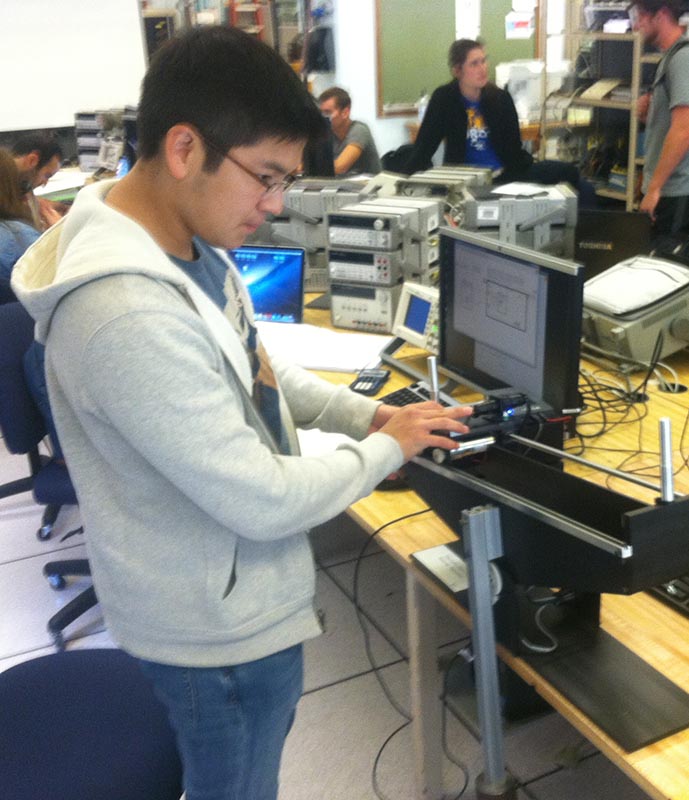The Systems, Measurements, and Controls Revolution
The principles of systems, measurements, and controls build the foundation for the entire engineering field, playing a vital role in electronics, robotics, engines, manufacturing, and numerous other fields. But how can educators teach these concepts to undergraduates, and ensure that they stay relevant as they progress through their careers?
Purdue's Mechanical Engineering faculty recently took the initiative to revitalize the standard systems and controls curriculum to emphasize hands-on experiences. "The previous class lineup was a bit disjointed," said Peter Meckl, chair of the Systems, Measurements, and Controls area. "Many students didn't get exposed to more advanced concepts in controls. By the time they got to their senior year, less than a third of them had the skills to incorporate automation into their senior design projects."
Step one involved flipping the classroom. Most traditional knowledge-based instruction now takes place online via self-directed videos, so that when students are together in the classroom, they can take advantage of the time to put into practice what they've learned. "ME365 and ME375 are now more logically sequenced," said Galen King, professor of mechanical engineering and chief architect of the new course sequence. "The concept of closed-loop control is introduced right from the beginning and is reinforced as various system analysis tools are introduced. And both courses incorporate a lab component, which helps students grasp the concepts and apply them more thoroughly."
 The laboratory activities are structured around a microcontroller by National Instruments, called myRIO. About the size of a paperback book, it incorporates numerous digital and analog ports, a three-axis accelerometer, and a Wi-Fi interface. It also uses LabVIEW software, allowing students to jump into designing systems with a graphical interface, instead of first having to learn a programming language. "LabVIEW is used at high levels of industry," said King, "so it's great that students can use the same tools at the beginner level that their peers use at a professional level."
The laboratory activities are structured around a microcontroller by National Instruments, called myRIO. About the size of a paperback book, it incorporates numerous digital and analog ports, a three-axis accelerometer, and a Wi-Fi interface. It also uses LabVIEW software, allowing students to jump into designing systems with a graphical interface, instead of first having to learn a programming language. "LabVIEW is used at high levels of industry," said King, "so it's great that students can use the same tools at the beginner level that their peers use at a professional level."
As a final project in the ME375 class, students build robots out of their myRIO controllers to perform increasingly complex tasks. One year, the challenge involved visually sensing tennis balls and "herding" them into a pen; the next year, students had to draw a perfectly-proportioned letter "P" on a dry erase board. In recent semesters, teaching assistants have built a glitzy new "racetrack" for the robots, challenging the students' skills to accurately guide their robot down the track and balance on a teetering platform. "We want them to appreciate what it takes to build an integrated system," said George Chiu, professor of mechanical engineering. "It's not just mechanical engineering, or electrical engineering; there's collaboration between the two, so everyone needs to work together to be successful."
An elective senior-level systems class, ME475, intensively investigates controller design for both continuous and discrete systems, including root locus, frequency methods, and state feedback. The revamped course also explores implementation issues such as jitter, resource optimization, and embedded field programmable gate array (FPGA) control, an important feature available on the myRIO.
Students have responded positively to the change:
- "The class was very well structured. I especially liked the week on/week off lab with alternating home projects."
- "I enjoyed how [the professor] would do examples in class and would work through them with us."
- "I really enjoyed the take-home myRIO assignments […] I really liked how they complemented what we were learning in class and how they forced us to create [programs] from scratch."
- "Not only have I learned a tremendous amount of material but [the sheepdog project] was a fun project to work on. The competition was icing on the cake."
Faculty are also excited. "Changing curriculum can be a bit daunting," said Meckl. "But it's clear that this new sequence of ME365, ME375, and ME475 has been a change for the better for all of our students."
Contributed by Peter Meckl, Galen King, George Chiu, and Jeff Shelton
